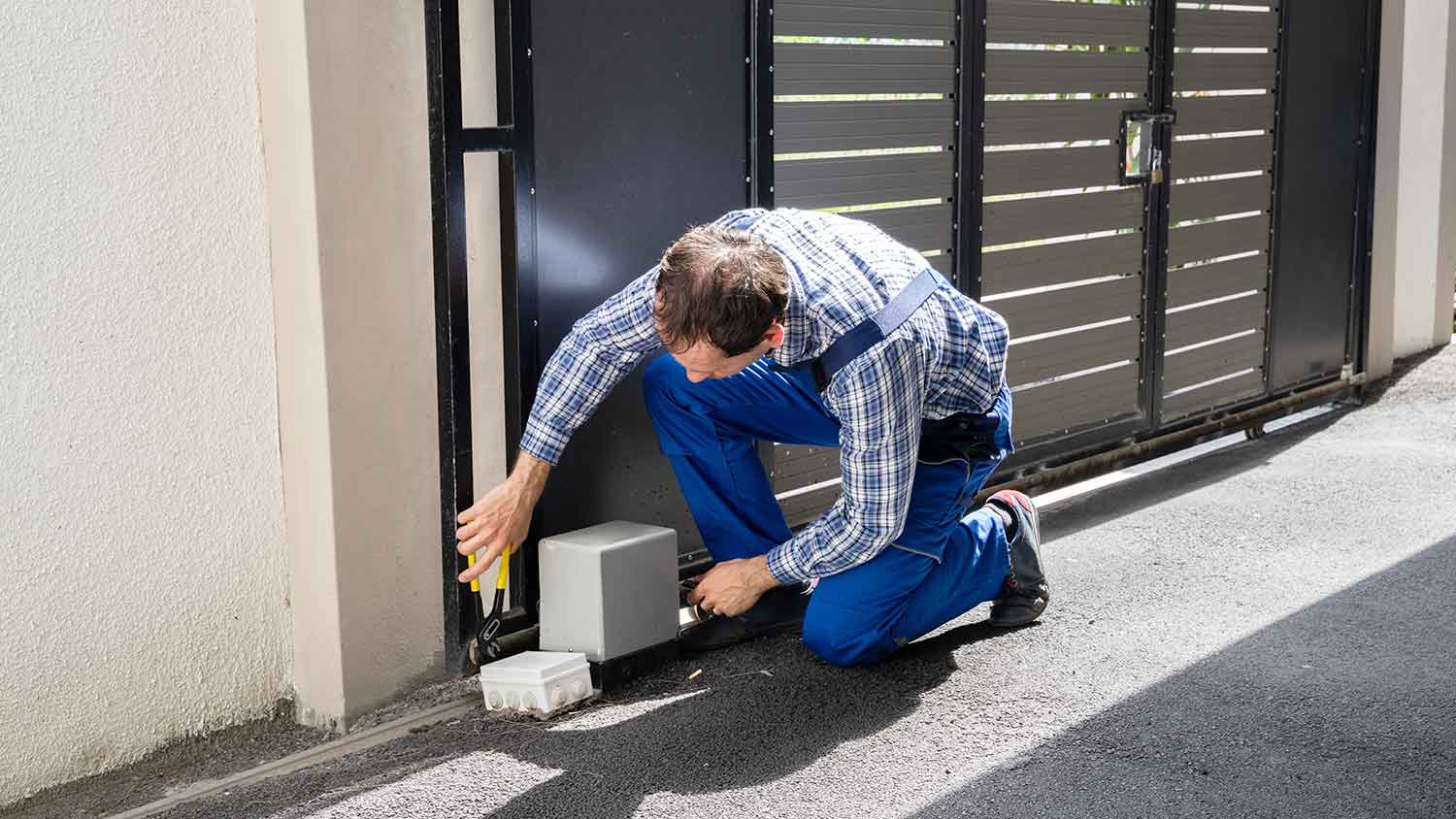
Find out the average automatic gate repair cost, key price factors, and ways to save. Get expert tips to budget for your automatic gate repair.
Driveway gate service costs depend on your project and location. Check with a local pro for your specific job.
Automatic gate installation costs depend on gate size, labor, and automation system type.
Automatic gates enhance curb appeal and can increase property value, offering a 50% to 70% return on investment (ROI).
Swinging automatic gates are the most affordable option, ranging from $1,000 to $6,000, while bi-fold gates can reach as high as $15,000.
Permit fees range from $50 to $300, depending on your project’s specifics and where you live.
This article was created using automation technology and thoroughly fact-checked and edited by an Angi Editor in accordance with our AI policy.
Automatic gate installation cost averages $4,000, with most homeowners spending between $2,380 and $8,000. Prices depend on gate size, automation system, and labor.
This guide covers everything you need to know about automatic gate installation cost, including price factors, options, and tips to help you make an informed decision for your home.
Several important factors influence the total cost of your automatic gate installation. Here’s a closer look at how your total breaks down.
Gate size is one of the most important factors influencing automatic gate installation cost. Both the width and height of your gate will impact material needs, automation strength, and overall labor.
Wider gates—such as those designed for double driveways—require more robust motors and additional installation time. Standard residential gates are often between 10 and 16 feet wide. Custom sizing or extra-tall gates also increase the total price, since they require special fabrication and more powerful automation components.
| Gate Width (Feet) | Average Cost |
|---|---|
| 10 | $500–$3,000 |
| 12 | $1,000–$4,000 |
| 14 | $1,200–$5,000 |
| 16 | $1,500–$6,000 |
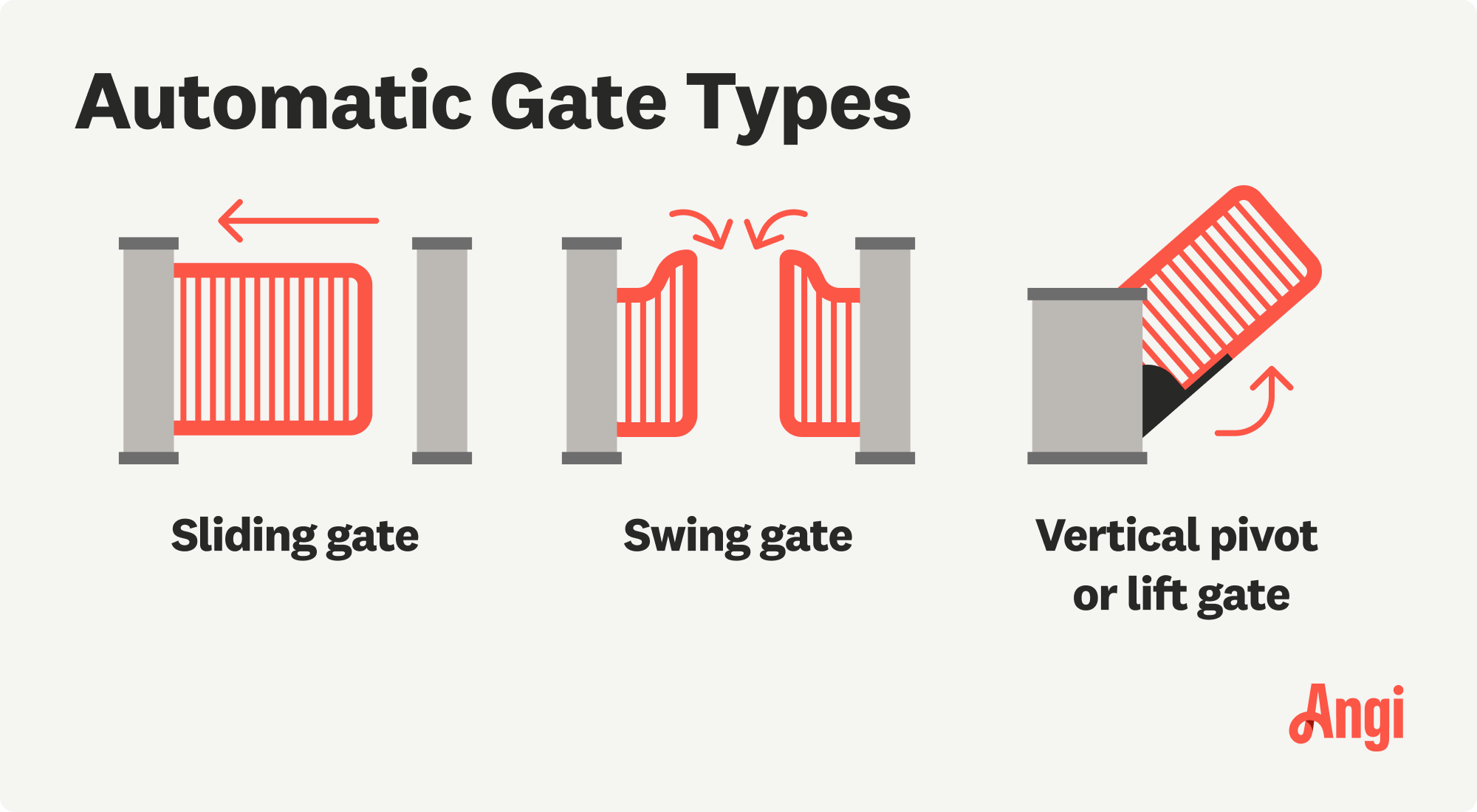
The type of automatic gate you choose greatly affects installation cost, function, and maintenance. Let’s look at the most common types and their unique considerations.
Swing gates are popular for their classic look and are available in single or double configurations. Double swing gates cost more because they require two motors and more hardware. Sliding gates, which move horizontally along a track, are ideal for sloped or limited spaces and may cost more due to track installation. Vertical lift and bi-fold gates are less common for homes but are used where space is tight or for added security, raising costs further. Cantilever gates add advanced features and smooth operation, but these upgrades also increase your budget
| Gate Type | Description | Average Cost | Pros | Cons |
|---|---|---|---|---|
| Swing | Hinged, swings open | $1,000–$6,000 | Simple, less hardware | Needs space to swing |
| Sliding | Moves sideways on track | $1,500–$5,000 | Good for sloped driveways | Needs clear track space |
| Vertical lift | Raises vertically | $3,000–$12,000 | Saves space, secure | Complex, costly |
| Bi-fold | Folds as it opens | $4,000–$15,000 | Fast opening, compact | More maintenance |
| Cantilever | Slides without ground track | $6,000–$10,000 | No ground obstruction | More structure required |
Where you live and where the gate is installed on your property both impact automatic gate installation cost. Regional material and labor rates, as well as climate, play a big role.
Urban areas often have higher labor and material costs due to demand, while rural locations might see lower rates but fewer specialists. Local availability of materials and climate concerns—like corrosion resistance in coastal regions—can also change your price.
Installation site matters, too. Gates installed on sloped driveways or uneven terrain require more time and materials. If you’re adding a gate to an existing fence, you might save on prep costs. Underground utilities, landscaping, or tight access can all increase labor hours and complexity.
Gate installation requires skilled trades, including gate installers, electricians, and sometimes masons. Labor rates range from $50 to $150 per hour, depending on your region and the complexity of the project. Some companies charge flat fees for standard installations, but custom jobs or challenging sites increase labor hours and cost. Minimum service fees or call-out charges may apply, especially for smaller jobs.
Most municipalities require permits for automatic gate installation, especially if electrical work or structural changes are involved. Permit fees range from $50 to $300, depending on your location. Some areas require inspections for safety and code compliance, which can add to the timeline and cost. Contractors typically handle permits, but always confirm who is responsible before work begins.
Modern automatic gates offer a range of upgrades. Automation system options include remote controls, keypads, intercoms, and smart home integration, each adding $100 to $1,500 to your total. Security features such as cameras, sensors, or alarms raise costs further. Power supply choices—like solar panels versus hardwired electric—also impact your budget. Lighting, decorative finishes, and custom elements all add to the final price.
Site complexity, such as sloped driveways, rocky soil, or the need to remove trees, increases installation cost.
Accessibility issues, like tight spaces or limited equipment access, can require more labor and specialized equipment.
Site preparation, including excavation, grading, or removing old fencing, adds both time and expense.
Delivery and material handling fees, post-construction cleanup, and debris removal may appear as separate line items.
Custom gates may require design or engineering fees.
Required inspections, either during or after installation, can add to your total.
Automatic gate installation cost extends beyond the initial setup. Here’s what else to plan for.
Most gates and automation systems come with manufacturer warranties covering parts for one to five years. Extended warranties, which may cost $200 to $800, can provide added peace of mind. Warranties often cover motors, electronics, and sometimes labor, but always check what is included. Strong warranties can add long-term value by reducing repair costs.
Automatic gates use electricity to power motors and controls. Expect to spend $30 to $100 per year on electricity, depending on gate size and usage. Battery-powered or solar systems may require more frequent maintenance or battery replacement, costing $50 to $200 annually. Smart device connectivity or monitoring services may have subscription fees.
Routine maintenance, such as lubricating hinges, cleaning sensors, and checking safety features, keeps your gate running smoothly. Plan for $150 to $400 per year in maintenance costs. Common repairs—like replacing a motor or fixing a track—range from $200 to $1,500, depending on the issue. Annual professional inspections are recommended for safety and reliability.
Sales tax applies to materials and sometimes to installation services, based on your local and state regulations. This can add 5% to 10% to your total bill, depending on where you live.
Adding an automatic gate may affect your homeowner’s insurance. Some providers require you to notify them of the installation, and coverage may extend to liability for gate operation. Check with your insurance company about premium changes or coverage requirements.
Choosing between DIY and professional installation affects cost, quality, and safety. Here’s what to consider.
If you install your own automatic gate, you’ll pay for materials and an automation kit, which can range from $1,200 to $4,000. You’ll need tools such as a post hole digger, concrete mixer, and wiring equipment. DIY installation requires skills in carpentry, masonry, and electrical work, plus a significant time commitment—often several days. Risks include safety hazards, code violations, and possibly voiding manufacturer warranties.
Hiring a pro means your installation will include site prep, electrical wiring, motor programming, and safe operation. While labor and material markups increase the total cost, you benefit from quality assurance, expert troubleshooting, and warranty coverage. Pros can also handle permitting and inspections, ensuring everything is up to code.
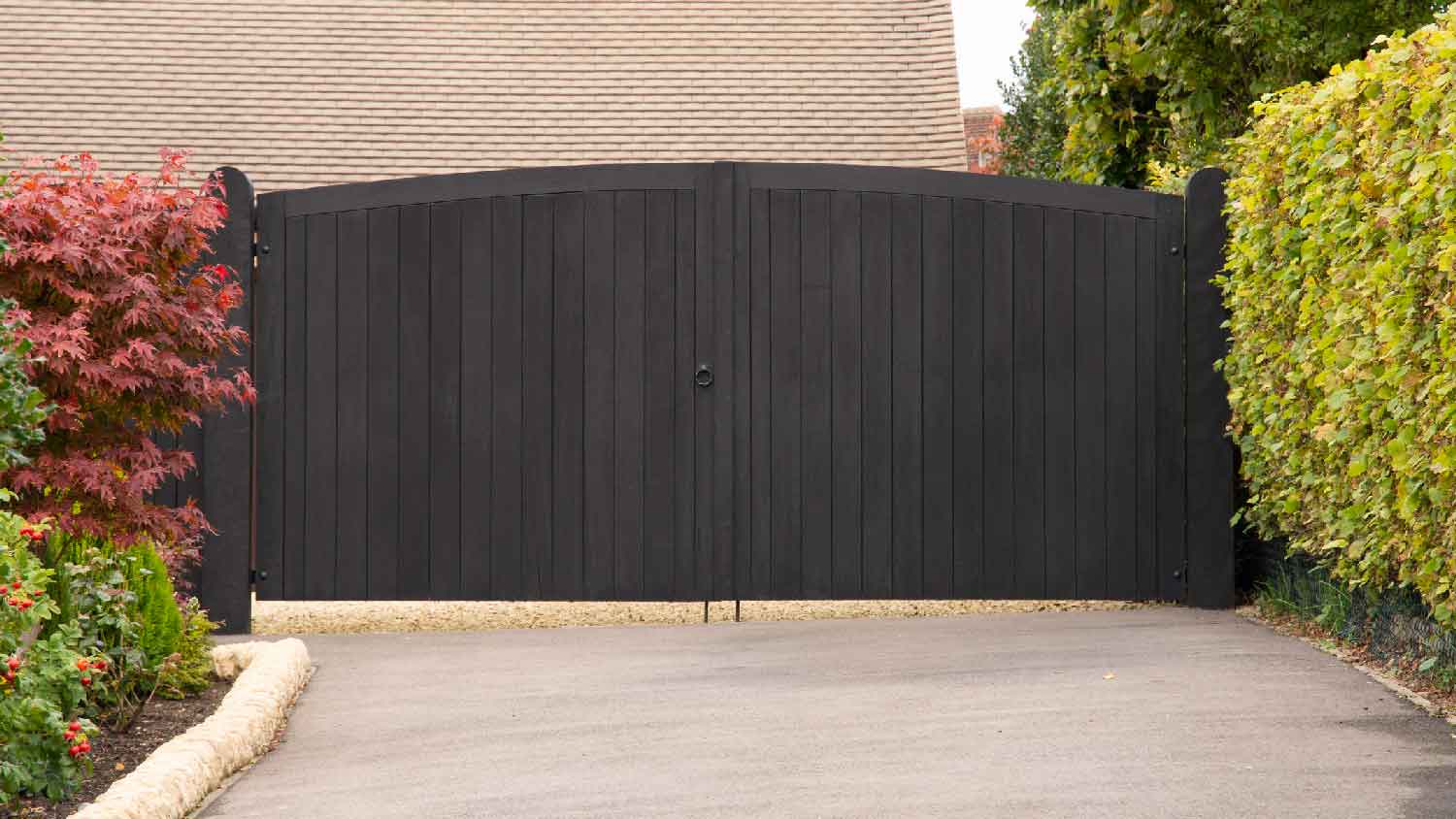
Deciding whether to repair or replace your automatic gate depends on several factors.
Automatic gate repairs are suitable if your gate has minor issues, such as a failed motor, damaged panel, or sensor malfunction, and the rest of the system is in good condition. If the gate is older, out of warranty, or if repair costs approach 50% of replacement cost, a full replacement is often the better investment.
Repairing a motor or electronics costs between $200 and $1,500. Full replacement—including a new gate, automation system, and installation—ranges from $2,500 to $8,000 or more. Replacing an aging or unreliable gate can provide better long-term value and fewer headaches.
Automatic gates can be a wise investment, offering both tangible and intangible returns.
The ROI for automatic gate installation ranges from 50% to 70%, depending on location, gate type, and property value. A well-installed gate improves curb appeal and can increase your home’s appraised value. Security and privacy benefits are especially appealing to prospective buyers.
While fencing, landscaping, and security systems also add value, automatic gates combine these benefits. They enhance security and appearance while offering modern convenience. In many neighborhoods, a quality gate can set your property apart.
Automatic gates improve safety by controlling access, protecting children and pets, and deterring unwanted visitors. Remote operation adds everyday convenience, and universal design features make entry easier for all users. Custom designs and materials let you match your home’s style, further enhancing curb appeal.
Consider these cost-saving strategies to make your automatic gate project more budget-friendly:
Get multiple quotes from local gate installers for the best pricing.
Choose standard gate sizes and materials to avoid custom fees.
Opt for basic automation features and add upgrades later.
Perform simple site prep tasks yourself (e.g., clearing vegetation).
Schedule installation during off-peak seasons for potential discounts.
Maintain your gate regularly to avoid costly repairs.
Home is the most important place on earth, which is why Angi has helped more than 150 million homeowners transform their houses into homes they adore. To help homeowners with their next project, Angi provides readers with the most accurate cost data and upholds strict editorial standards. We extensively research project costs to develop the pricing data you see, so you can make the best decisions for you and your home. We rely on reputable sources, including the U.S. Bureau of Labor Statistics, academic journals, market studies, and interviews with industry experts—all to ensure our prices reflect real-world projects.
Want to help us improve our cost data? Send us a recent project quote to [email protected]. Quotes and personal information will not be shared publicly.
From average costs to expert advice, get all the answers you need to get your job done.

Find out the average automatic gate repair cost, key price factors, and ways to save. Get expert tips to budget for your automatic gate repair.

Gate installation costs depend on the material your gate is made of, and the type of gate you want to install. Explore all the gate installation cost factors in this guide.

This guide teaches you how to build a driveway gate in 9 steps. Here’s everything you need to know to create and install a simple wood driveway gate.
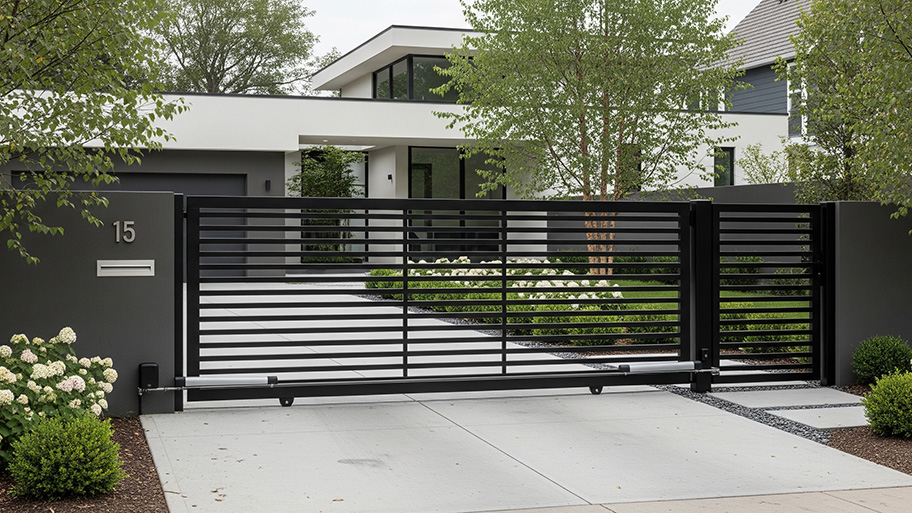
Finding the perfect security solution for your property is of the utmost importance. Here's how to choose between popular types of automatic gates.

How valuable driveway gates are depends on many factors like size and materials. Read this guide to see if driveway gates do add value to homes.
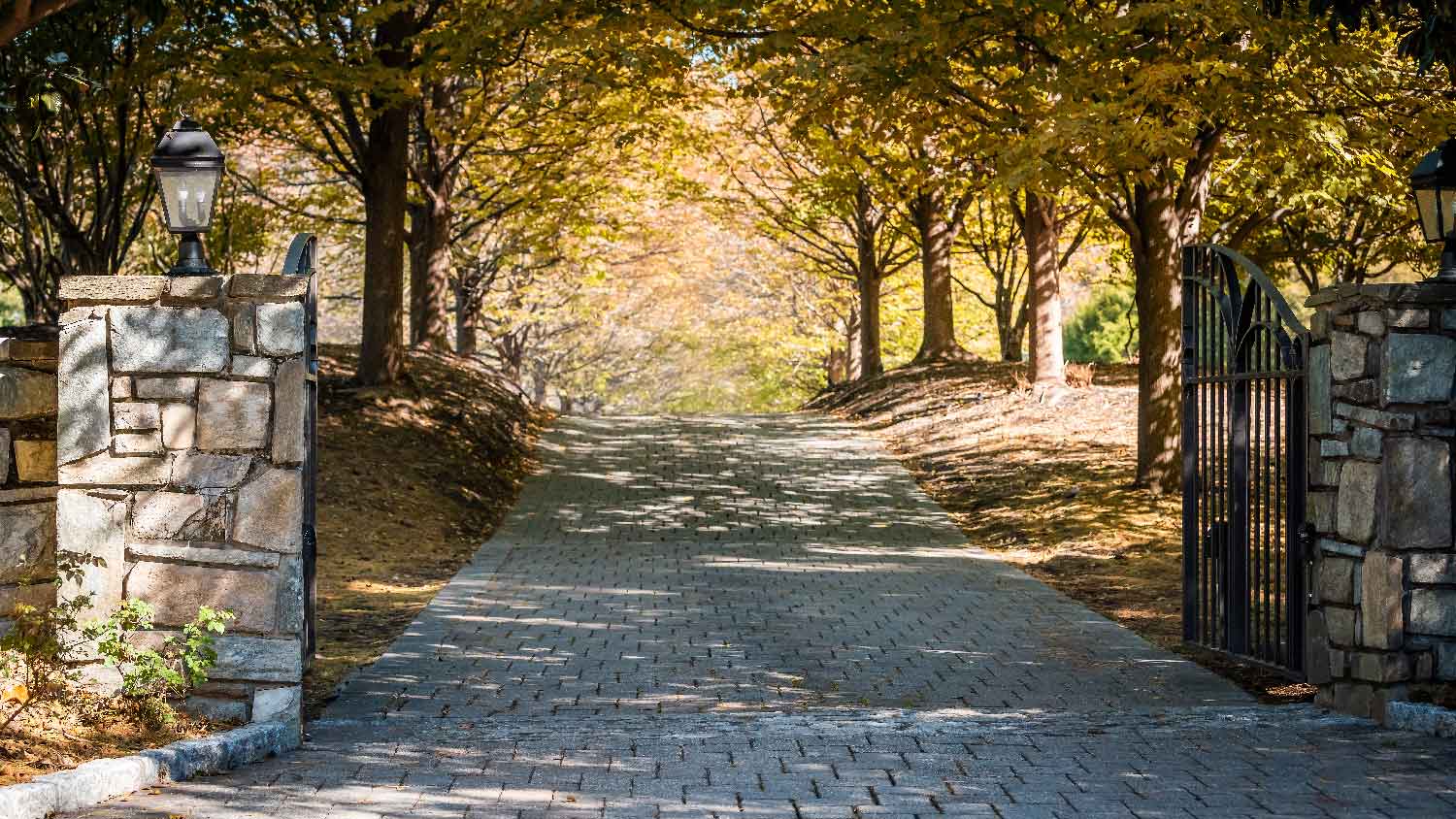
If you’re preparing to install a driveway gate, here are the questions you should ask a contractor about the project.